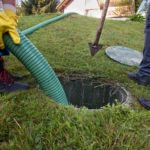Be Septic Safe this Holiday Season

With the holidays upon us, it’s essential to prepare our homes for guests. One preparation we cannot overlook is maintaining our septic systems. With more food and people, these wastewater treatment systems get a workout! A septic system uses natural and technological processes to treat household wastewater from toilets, sinks, and water-using appliances. When a septic system isn’t maintained, it fails and can spread untreated sewage into homes or nearby water resources. Untreated wastewater contains bacteria, viruses, and other pollutants. Ensure that your holidays do not end with a smelly septic system failure by following best practices.
-
1. Inspections and pump-outs
Regularly inspecting and pumping out septic systems can help detect septic system issues early on. Early detection can keep repair costs down and potentially avert expensive problems. Be sure to:
• Check the drain field for signs of failure monthly.
• Check the clean-out for blockages or leaks annually.
• Pump out the system every 3 – 5 years. -
2. Drain field protection
The drain field is where liquid waste goes to be cleaned by the soil. If a drain field becomes compacted, it can cause the septic system to clog and back up. Protect your drain field by:
• Knowing and marking the drain field location.
• Keeping the area free of parked vehicles, equipment, and structures.
• Planting only turf grass on the drain field. -
3. Proper waste disposal
When certain materials enter the septic system, they can cause failures by clogging or killing the system’s microbial community. Keep your septic system healthy by keeping the following OUT of the system:
• biological additives
• cat litter
• coffee grounds
• diapers
• fats, oils, or grease
• feminine hygiene products (pads, tampons, etc.)
• flushable wipes
• liquid/chemical drain openers
• medication
• non-septic-safe cleaning products
• paper towels
• raw meat
• yeast -
4. Efficient water use
Efficient water use can help prolong the life of your septic system by reducing clogs. You can reduce water use by:
• Installing high-efficiency appliances and low-flow fixtures.
• Running machines only when there’s a full load.
• Turning on only one water-using device at a time.
For more information, check out Clemson Extension’s Be Septic Safe webpage!
Clemson University Cooperative Extension Service offers its programs to people of all ages, regardless of race, color, gender, religion, national origin, disability, political beliefs, sexual orientation, gender identity, marital or family status and is an equal opportunity employer.
